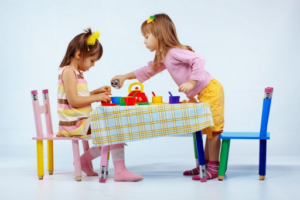What is Play?
- Play is enjoyable and valued by the player.
- Play is intrinsically motivating.
- Play is spontaneous and voluntary.
- Play involves some active engagement on the part of the player.
- Play is linked with creativity, problem-solving, language learning, and the development of social roles, and a number of other cognitive and social phenomena.

Play Stages Birth to Six Years
Jean Piaget divided play into two categories for children ages birth to six years; sensorimotor play and symbolic play. Sensorimotor play is the first stage of play that children engage in from infancy to age two. Children in this stage of development are acquiring control over their movements and learning to coordinate their gestures. Infants use their developing motor skills to interact with their surrounding environments and experiment with the world of touch, sight and sound. Children in this play stage find pleasure in being able to cause events to reoccur (e.g., banging objects together to make sound or repeatedly hitting a mobile to make it move!).
Sensorimotor Play at a Glance 0-2:
- Infants will create memories of what they feel, see, and hear. These memories will be reenacted in their later pretend play.
- Children begin to engage in simple symbolic play toward the end of the second year. A doll will represent a baby and blocks will become a house!
- More imaginative fantasy gradually emerges into the pretend play.
- Two-year-olds have difficulty differentiating between fantasy and reality, even in their own pretend scenarios (e.g., a child who dresses up in a witch costume may believe that they have actually turned into a witch!).
What Can I Do to Promote Sensorimotor Play Experiences for My Child?
- Provide your infant with a variety of toys that they can explore with their senses (e.g., rattles, light up toys, safe objects to mouth on).
- As symbolic play begins to emerge, provide your child with toys that serve a clear purpose (e.g., baby doll and bottle, teapot and cups).
- Participate in these early pretend play experiences with your child to help them expand their play schemes by offering suggestions (e.g., singing, “Happy Birthday” when having a birthday party and blowing out the candles!).

Symbolic or representational play is the second stage of play defined by Piaget.This type of play occurs from ages three to six. During this stage of development, children acquire the ability to think and learn in symbols. Children can now recall images of events and understand what symbols in their surrounding environments represent (e.g., McDonald’s golden arches mean a yummy dinner is ahead!).
Symbolic/Representational Play at a Glance 3-4:
- Three-year-olds’ play is often connected to their real-life experiences and typically includes language and props.
- A child may assign roles (e.g., mommy, doggy, baby sister) to others when engaging in cooperative symbolic play experiences.
- Four-year-olds’ pretend play becomes more detail-oriented and portrays realistic life experiences.
Symbolic/Representational Play at a Glance 5-6:
- Five and six-year-olds’ now have a stronger understanding of the difference between fantasy and reality, which makes participating in pretend play experiences that much more enjoyable!
- Children can dramatize and extend play themes for longer periods of time due to their increased attention spans and awareness of detail.
What Can I Do to Promote Symbolic Play Experiences for My Child?
- Offer a wide variety of props that reflect your child’s daily experiences (e.g., play food and cooking utensils, doctor tools, grocery cart and store items).
- Help your child incorporate their favorite story books into their pretend play experiences. Provide character props and assist your child in retelling and extending the story line.
- Provide your child with various art materials (e.g., cardboard boxes, markers, paint, etc.,) and inspire them to make their own props to incorporate into their play schemes.
Reenie Luze, MS, DT
Developmental Therapist
References:
Lillard, A. S., Pinkham, A., & Smith, E. D. (2011). Pretend play and cognitive development. London, England: Blackwell.
Scholastic Early Childhood Today. (2021). Ages and Stages: Imagine and Pretend. Retrieved February 2022, from https://www.scholastic.com/teachers/articles/teaching-content/ages-stages-imagine-pretend/.
Vygotsky, L. (1978). Mind in society: The development of higher psychological processes. Cambridge, MA: Harvard University Press. Ch 7: The Role of play in development (pp. 92-104).
Photo credit: Steemiteducation & MamaOT
